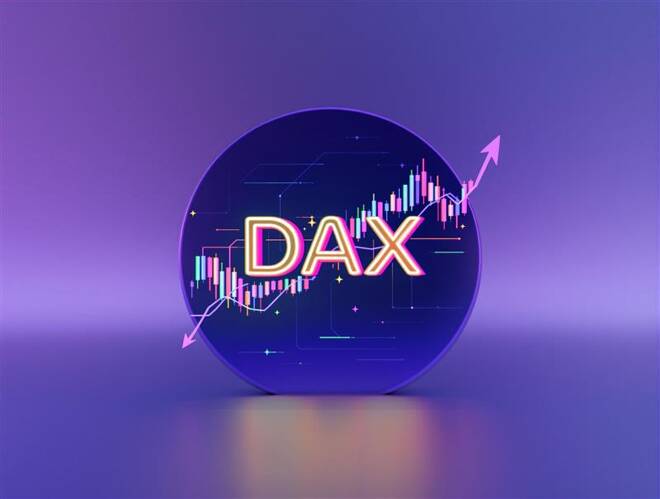Advertisement
Advertisement
Dax Index News: DAX Hits Record High on Fed Outlook and Trade Deal Optimism
By:
Key Points:
- DAX climbs 0.36% to record highs, boosted by Fed rate cut hopes and US-EU trade deal optimism.
- EU and US may finalize a framework trade agreement before Trump’s August 1 deadline, lifting market sentiment.
- Fed Minutes signal a potential Q3 rate cut, pushing the probability of a September cut to 73% from 64.6%.
DAX Eyes Four-Day Winning Streak on Fed Policy Cues and Trade Headlines
Investor optimism strengthened early Thursday, with the DAX rising 0.36% to 24,638, supported by Fed policy signals and renewed hope for a US-EU trade breakthrough. The index struck a record high of 24,639 and is on track for a four-day winning streak.
According to sources, the EU could reach an in-principle framework trade agreement in the coming days, well ahead of Trump’s August 1 deadline. President of the EU Commission Ursula von der Leyen stated:
“We are working closely with the US administration to get an agreement. We are looking for a clear framework from which we can keep building.”
Failed talks could lead the US administration to impose a 20% tariff on EU goods, with the potential for a higher 50% levy.
Sector Performance: Auto Stocks Extend Gains
Rising optimism over a US-EU trade deal boosted demand for auto stocks. Mercedes-Benz Group opened 1.08% higher, with BMW, Porsche, and Volkswagen.
Tech stocks also advanced, with Infineon Technologies and SAP gaining 0.47% and 1%, respectively.
German Inflation and the ECB in Focus
Finalized German inflation figures due later on Thursday may influence sentiment. According to preliminary data, Germany’s annual inflation rate cooled to 2% in June, down from 2.1% in May.
A downward revision may raise expectations of an ECB rate cut, boosting demand for DAX-listed stocks. Conversely, a higher reading may signal a less dovish ECB stance, potentially pressuring the DAX.
While the inflation numbers require consideration, trade developments remain the key driver for the DAX.
Wall Street Rallies on Fed Rate Cut Bets
US markets posted gains on July 9 as investors reacted to the FOMC Meeting Minutes. The Nasdaq Composite Index climbed 0.94%, while the Dow and the S&P 500 advanced 0.49% and 0.61%, respectively.
Trade developments took a backseat as the FOMC Meeting Minutes for June signaled a potential shift in Fed policy. The Minutes showed that most FOMC members supported a lower target range for the federal funds rate. Notably, members believed that the effect of tariffs on inflation may be moderate and temporary.
According to the CME FedWatch Tool, the probability of a September Fed rate cut increased to 73% on July 9, up from 64.6% on July 8.
US Jobless Claims and the Fed in Focus
US labor market data would likely influence the Fed rate path. Economists forecast initial jobless claims to rise from 233k (week ending June 28) to 235k (week ending July 5). A higher jobless claims reading could support a more dovish Fed rate path, lifting sentiment. Conversely, a lower-than-expected print may temper Fed rate cut expectations, pressuring risk assets like the DAX.
While the economic data will influence risk sentiment, Fed commentary and trade developments remain crucial for the DAX.
Near-Term Outlook
The DAX’s near-term trajectory depends on US-EU trade headlines, economic data, and central bank guidance.
- Bearish Scenario: Stalled US-EU trade talks, stronger-than-expected data, or hawkish central bank cues. Under these scenarios, the DAX may fall toward 24,000,
- Bullish Scenario: A US-EU trade agreement, weaker-than-expected data, and dovish central bank rhetoric may drive the DAX toward 24,750.
DAX Technical Indicators
Daily Chart
After a bullish start to the week, the DAX trades well above the 50-day and 200-day Exponential Moving Averages (EMA), indicating bullish momentum.
A breakout above 24,650 could pave the way to 24,750. Sustained buying pressure may drive the DAX toward 25,000.
On the downside, a break below 24,500 could expose the 24,000 mark. Increased selling pressure may bring the 50-day EMA into sight.
The 14-day Relative Strength Index (RSI), at 65.72, suggests the DAX could climb to 24,750 before entering overbought territory (RSI > 70).
Final Thoughts
Volatility could intensify as markets react to trade headlines, key economic data, and central bank policy commentary.
Traders should monitor both technical and fundamental drivers and consult our economic calendar.
About the Author
Bob Masonauthor
With over 28 years of experience in the financial industry, Bob has worked with various global rating agencies and multinational banks. Currently he is covering currencies, commodities, alternative asset classes and global equities, focusing mostly on European and Asian markets.
Advertisement
